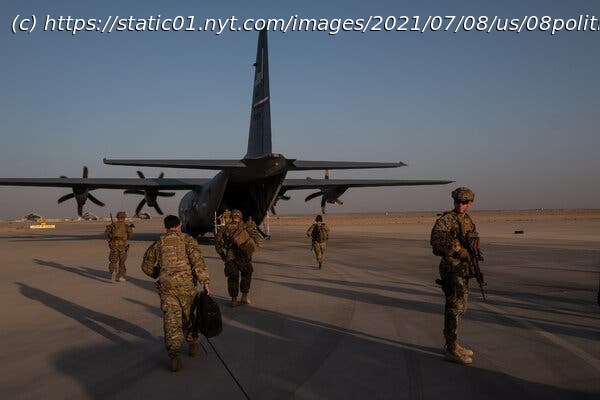The president’s remarks will follow a meeting where his national security team will update him on the progress of the withdrawal.
President Biden will deliver remarks Thursday afternoon about the future of Afghanistan, his first formal address on the country since American troops pulled out of the last remaining U.S. military base there last week, effectively ending U.S. military operations after two decades of war. The departure of American troops has been accompanied by reports of increasingly dire situations on the ground as local government forces crumble before the Taliban, which is gaining territory as it nears Kabul, the capital. In the span of just over two months, the Taliban have managed to seize at least 150 of Afghanistan’s 421 districts. Questioned on Friday about the risks of the accelerated pullout to the stability of the Afghan government, Mr. Biden said: “Look, we were in that war for 20 years. Twenty years.” He added, “The Afghans are going to have to be able to do it themselves with the air force they have.” But pressed to elaborate, the president cut the reporter off, saying, “I want to talk about happy things.” Mr. Biden’s remarks on Thursday will follow a morning meeting where his national security team will update him on the progress of the withdrawal. Vice President Kamala Harris is also expected to attend. In an interview on Fox News on Wednesday, John Kirby, the Pentagon spokesman, said that the Biden administration continued to “push for a negotiated peaceful, political settlement,” while adding that the Pentagon still had the ability to support Afghan forces even without a formal presence in the country. “We are all concerned about the security situation the ground,” Mr. Kirby said. “There’s no question about that.” Mr. Biden announced in April that the military would complete its withdrawal of the 3,500 troops left in Afghanistan by Sept.11. The pullout went faster than many had expected. On Friday, the U.S. exit from Bagram Air Base, a central hub, effectively ended major military operations, but the White House authorized the Pentagon to slow the final stages of the withdrawal. Only 650 troops are expected to remain in the country to protect the U.S. Embassy in Kabul and Kabul International Airport. But officials have said that the Pentagon would be authorized, at least through September, to move 300 additional troops into Afghanistan if needed for security or emergencies, like the possible evacuation of the American Embassy, a growing concern amid the deteriorating security in the country. Air support for the Afghan forces and overhead surveillance can also be flown in from American bases in Qatar or the United Arab Emirates, or from an aircraft carrier in the Arabian Sea. But it is unclear how long the United States will maintain that type of support. As the Taliban consolidates power in Afghanistan, the threat to American allies who remain in the country grows. Senior officials have said that the Biden administration is preparing to relocate thousands of Afghan interpreters, drivers and others who worked with American forces to other countries in an effort to keep them safe while they apply for entry to the United States. In his speech, Mr. Biden is expected to touch on plans for humanitarian assistance to Afghanistan, an issue that came up last week when Afghanistan’s president, Ashraf Ghani, visited the White House. The Biden administration has committed $266 million in humanitarian aid and $3.3 billion in security assistance. It has also pledged three million doses of the Johnson & Johnson vaccine and oxygen supplies, as efforts to address the latest wave of the coronavirus have been hampered by fighting in the area. — Aishvarya Kavi The nation’s intelligence agencies are looking for ways to increase their expertise in a range of scientific disciplines as they struggle to answer unexplained questions — about the origins of the coronavirus pandemic, unidentified phenomenon observed by Navy pilots, and mysterious health ailments affecting spies and diplomats around the world. Traditional spycraft has failed to make significant progress on those high-profile inquiries, and many officials have grown convinced that they require a better marriage of intelligence gathering and scientific examination. The White House has given the intelligence community until later this summer to report the results of a deep dive into the origins of the coronavirus. It has pledged to make progress on determining the cause of ailments known as Havana syndrome. And a preliminary inquiry into unidentified flying objects failed to explain almost any of the encounters, prompting intelligence officials to promise a follow-up in the next three months. To bolster the role of scientific expertise, the Office of the Director of National Intelligence brought an experienced epidemiologist from the State Department’s intelligence and research division to serve on the National Intelligence Council, according to intelligence and other government officials.






